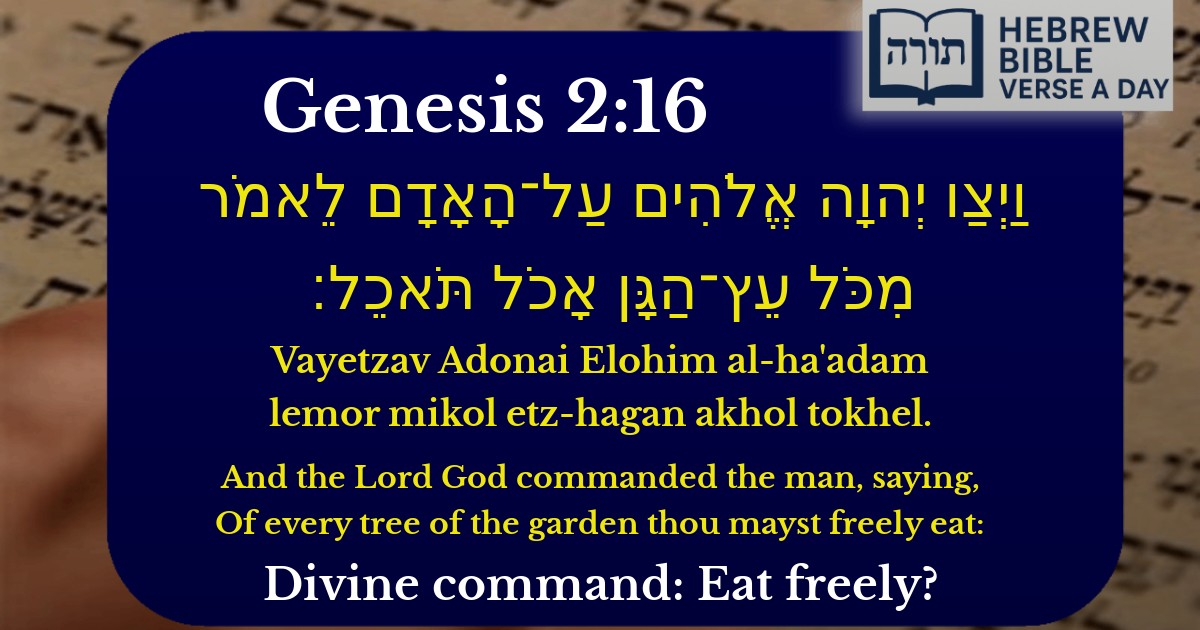Join Our Newsletter To Be Informed When New Videos Are Posted
Join the thousands of fellow Studends who rely on our videos to learn how to read the bible in Hebrew for free!
Hebrew Text
וַיְצַו יְהוָה אֱלֹהִים עַל־הָאָדָם לֵאמֹר מִכֹּל עֵץ־הַגָּן אָכֹל תֹּאכֵל׃
English Translation
And the Lord God commanded the man, saying, Of every tree of the garden thou mayst freely eat:
Transliteration
Vayetzav Adonai Elohim al-ha'adam lemor mikol etz-hagan akhol tokhel.
Hebrew Leining Text
וַיְצַו֙ יְהֹוָ֣ה אֱלֹהִ֔ים עַל־הָֽאָדָ֖ם לֵאמֹ֑ר מִכֹּ֥ל עֵֽץ־הַגָּ֖ן אָכֹ֥ל תֹּאכֵֽל׃
וַיְצַו֙ יְהֹוָ֣ה אֱלֹהִ֔ים עַל־הָֽאָדָ֖ם לֵאמֹ֑ר מִכֹּ֥ל עֵֽץ־הַגָּ֖ן אָכֹ֥ל תֹּאכֵֽל׃
🎵 Listen to leining
Parasha Commentary
📚 Talmud Citations
This verse is quoted in the Talmud.
📖 Sanhedrin 56b
The verse is discussed in the context of the Noachide laws and the commandments given to Adam.
📖 Berakhot 40a
The verse is referenced in a discussion about the permissibility of eating from the trees of the Garden of Eden.


Rashi's Explanation
Rashi (Bereshit 2:16) explains that the phrase "מִכֹּל עֵץ־הַגָּן אָכֹל תֹּאכֵל" ("Of every tree of the garden thou mayst freely eat") emphasizes the permissibility of eating from all trees in Gan Eden except the Tree of Knowledge, which is mentioned in the next verse. The repetition of the verb "אָכֹל תֹּאכֵל" ("you may surely eat") underscores the abundance and freedom granted to Adam, reinforcing that Hashem's initial command was one of generosity and permission rather than restriction.
Rambam's Perspective
In Moreh Nevuchim (1:2), Rambam interprets this verse as highlighting the principle of free will. Hashem granted Adam the ability to choose between obedience and disobedience, setting the stage for the test of the Tree of Knowledge. The broad permission to eat from all trees except one establishes the framework for moral decision-making, a foundational concept in Jewish thought.
Midrashic Insights
Halachic Implications
The Kli Yakar (Bereshit 2:16) notes that the phrasing "וַיְצַו" ("And He commanded") is unusual for a positive instruction, as tzivuy (commandment) typically refers to prohibitions. He explains that this teaches that even permissible acts must be performed with intentionality and gratitude, recognizing them as gifts from Hashem. This aligns with the broader Jewish ethic of brachot (blessings) over permitted enjoyments.